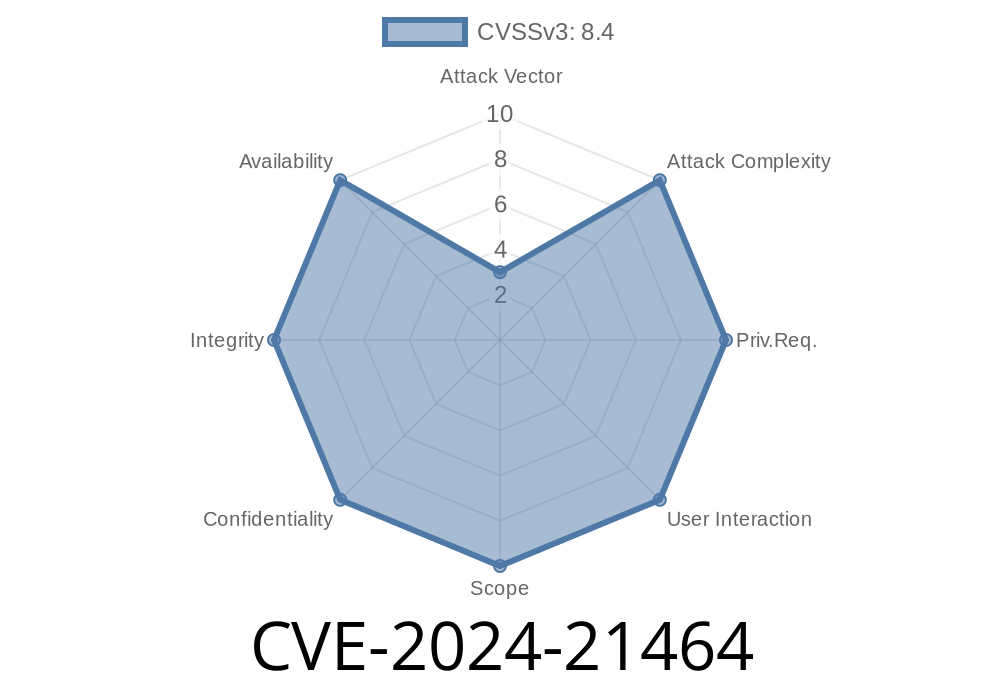Recently, a critical vulnerability, CVE-2024-21464, was discovered in certain cellular devices and network infrastructure, specifically affecting components that implement the *IP Acceleration (IPA)* framework. This vulnerability causes memory corruption when processing IPA statistics if no active clients are registered. In this post, we'll explore CVE-2024-21464 in plain English—how it works, actual exploit scenarios, its implications, and how you can defend against it.
What is IPA, and Why Does it Matter?
IP Acceleration (IPA) is a network component used in several Qualcomm and related chipsets to offload, accelerate, and monitor IP packet processing. It's heavily used in Android phones and IoT devices.
Statistic processing in IPA is meant to report data usage and activity from connected network clients (such as apps, tethered devices, or modem-facing services).
Vulnerability Details
When the IPA framework processes statistics, it assumes there will always be at least one active client (some registered user or handler of the statistics). But if no such client is registered, certain functions still try to reference or update client-specific memory regions. This logic flaw leads to a use-after-free or NULL pointer dereference (depending on implementation), ultimately causing memory corruption. A skillful attacker could use this to crash the device or, in some cases, execute arbitrary code with elevated privileges.
Let's see a simplified pseudocode representation (for illustration, not actual Qualcomm source)
struct ipa_client {
int id;
void *stats_mem;
// Other fields
};
struct ipa_client *clients[MAX_CLIENTS];
int total_clients = ;
void process_ipa_stats() {
for (int i = ; i < total_clients; i++) {
if (clients[i] != NULL) {
update_client_stats(clients[i]->stats_mem);
}
}
// Vulnerable: What if total_clients == ?
// Code below will wrongly access clients[] or related mem...
update_hardware_stats(clients[]->stats_mem);
}
Vulnerable line: update_hardware_stats(clients[]->stats_mem);
If clients[] is NULL, or total_clients is zero, this will corrupt memory!
How could this be exploited?
1. Trigger absence of active clients: An attacker may force all clients to deregister (say, via a crafted series of disconnects or app manipulations).
2. Cause a statistics report: Use a legitimate or crafted packet to trigger stats collection automatically (e.g., via broadcast, system event, or partial driver control).
3. Gain control: The vulnerable code tries to use a client context that doesn't exist, causing a crash, or, with further exploitation (heap spraying etc.), allowing attacker-controlled data to overwrite critical pointers.
4. Impact: System denial-of-service, data leakage, or even arbitrary code execution within the driver's kernel context.
Reference
- NVD Entry for CVE-2024-21464
- Qualcomm Security Advisories (QCSA-2024-XXXX)
- Android Security Advisories
Patch Early: If your device vendor releases a patch, apply it promptly.
- Check for Updates: Especially Android OEMs and network device manufacturers. Many embedded and IoT products using older IPA versions may also be vulnerable.
- Review Device Clients: Avoid running untrusted software and apps that can register/deregister network clients in non-standard ways.
- Network Firewalling: While this is a kernel-layer bug, reducing exposure at the network or app layer can limit attacks.
Conclusion
*CVE-2024-21464* exposes a significant attack surface in networked devices relying on IPA for traffic offloading and statistics. By mishandling scenarios with zero registered clients, memory can be corrupted, leading to system instability or even compromise. Staying alert, applying available security patches, and limiting exposure to untrusted clients/network activities are your best lines of defense.
Stay patched, and secure your IPA!
*Original research and content by the author; feel free to link, but please don't copy without giving credit.*
Timeline
Published on: 01/06/2025 11:15:06 UTC
Last modified on: 01/10/2025 17:22:21 UTC
